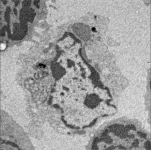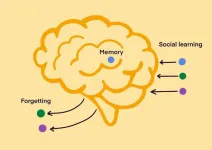(Press-News.org) ST. LOUIS - Research from Saint Louis University School of Medicine finds that among patients 65 and older, a diagnosis of anxiety was significantly associated with an increased risk of dementia diagnosis, and benzodiazepine exposure was associated with a 28% increased risk of dementia. However, when benzodiazepines were prescribed to patients with an anxiety disorder, there was no significant association between these medications and incident dementia.
The study, “Anxiety Disorders, Benzodiazepine Prescription and Incident Dementia,” was published online July 28 in the Journal of the American Geriatrics Society.
Jay A. Brieler, M.D., associate professor of family and community medicine at SLU, is the paper’s first author. Jeffrey Scherrer, Ph.D., professor of family and community medicine and a member of the AHEAD Institute, is the senior author.
The study’s authors found while there is an association between anxiety and dementia, and an association between benzodiazepines and dementia, there is no association between these medications and dementia when prescribed to persons with an anxiety disorder.
It is unknown whether treating late-life anxiety disorders with benzodiazepines exposes patients to additional risks of dementia. Anxiety in older adults can be linked with cardiovascular disease, diabetes, depression, social withdrawal, physical inactivity, sleep disturbance, smoking, obesity, alcohol consumption and chronic disease burden.
Benzodiazepine prescriptions for older patients is controversial. Their use has been associated with short term cognitive impairment, falls, and fractures. Per Dr. Brieler,
“As a clinician who frequently treats patients with anxiety disorders, recent studies suggesting benzodiazepine use could contribute to dementia were very concerning to me,” Brieler said. “I had the assumption that if a benzodiazepine was used and side effects occurred, simply stopping the medication would remedy the problem over time.
“The difficult issue with those studies is that anxiety itself is also associated with dementia. It was still unclear from the literature whether the disease or the treatment was the culprit. Based on our work, it appears that both are playing a part, but it remains uncertain how the two interact with each other.”
This retrospective cohort study reviewed the electronic health data of 72,496 patients from 2014-21.
The de-identified medical record data was obtained from the Saint Louis University-SSM Healthcare System’s Virtual Data Warehouse (VDW). The VDW, created and maintained by the Advanced HEAlth Data (AHEAD) Research Institute at Saint Louis University, captures clinical encounters starting from Jan. 1, 2008, from academic and non-academic ambulatory and inpatient settings in the Midwest.
The VDW includes more than 5 million patients from birth to 90 years of age who have utilized services in the healthcare system since 2008.
Eligible patients were 65 years of age or older, had clinic encounters before and after index and were free of dementia for two years prior to index date. Of the cohort, 85.6% were white and 59.9% were female. The median age was 74.
Five million Americans 65 or older had an Alzheimer’s or related dementia diagnosis in 2014, which is expected to double by 2060.
“This study is a great example of using real-world clinical data to examine research questions that otherwise would not be practical to investigate,” Scherrer said. “We do not have the resources to follow tens of thousands of patients over time. We overcame that obstacle by using the VDW and expertise available in the AHEAD Institute.”
Takeaways
Anxiety was associated with a 19% increased risk of incident dementia independent of sustained benzodiazepine use.
Sustained benzodiazepine use was associated with a 28% increased risk of dementia.
Sustained benzodiazepine use among those with anxiety disorder did not lower or increase the risk of dementia.
Literature determining an independent association between anxiety and benzodiazepines with incident dementia is inclusive.
The authors recommend further studies to determine if the association with incident dementia varies across other anxiety medications.
Funds to maintain the Virtual Data Warehouse came from the Saint Louis University Research Institute. Saint Louis University is a member of the Health Care Systems Research Network.
Other authors include Joanne Salas, MPH, of the Department of Family and Community Medicine at Saint Louis University, Harry S. Truman Veterans Administration Medical Center, Columbia, Mo., and the Advanced HEAlth Data (AHEAD) Research Institute at SLU; Matthew E. Amick, Poorva Sheth, Elizabeth A. Keegan-Garrett, M.D., of the Department of Family and Community Medicine at Saint Louis University; and John Morley, MBBCh., of the AHEAD Institute at SLU.
AHEAD Institute
The Advanced HEAlth Data (AHEAD) Research Institute at Saint Louis University is a comprehensive center for data-driven innovation and research aimed at improving the health of individuals and populations.
The institute brings together researchers from various fields and disciplines to help improve patient and population health, advance the quality of health care and decrease health care costs. The new institute will utilize and develop data resources; novel analytic methods; predictive modeling; machine learning; and integrated, wearable health devices and will collaborate with national research networks.
Saint Louis University School of Medicine
Established in 1836, Saint Louis University School of Medicine has the distinction of awarding the first medical degree west of the Mississippi River. The school educates physicians and biomedical scientists, conducts medical research, and provides health care on a local, national and international level. Research at the school seeks new cures and treatments in five key areas: cancer, liver disease, heart/lung disease, aging and brain disease, and infectious diseases.
END
Increased risk of dementia diagnosis, benzodiazepine exposure in seniors with anxiety
2023-08-07
ELSE PRESS RELEASES FROM THIS DATE:
Paper addresses ethics of bioethics conference in Qatar
2023-08-07
The decision by a global bioethics association to hold its 2024 congress in Qatar, a nation with laws against LGBTQ+ people, provoked controversy, including objections from some of its own members.
The outcry motivated the organization’s president and colleagues to draft an ethics framework to guide future site selection. The framework, published today in The American Journal of Bioethics, might also help global organizations make decisions about ethically appropriate conference sites. [The paper is available in PDF by request.]
“Many organizations around the world are addressing these questions,” ...
Breakthrough polymer research promises to revolutionize recycling
2023-08-07
A team of researchers led by Brent Sumerlin, the George B. Butler Professor in the University of Florida Department of Chemistry, has made a breakthrough with the potential to transform how we recycle plastics. Their innovative approach to working with polymers has led them to develop a new method for recycling that promises to lower the energy requirement without sacrificing the quality of the plastic.
It’s no secret that the U.S. and the Earth at large have a pressing plastic problem. Despite a meteoric rise in usage over the past few decades, only about 10% of our plastic currently ends up getting recycled.
“Our work is a response ...
New study in JNCCN highlights rapid adoption of clinical research results into chemotherapy prescribing patterns
2023-08-07
PLYMOUTH MEETING, PA [August 7, 2023] — New research in the August 2023 issue of JNCCN—Journal of the National Comprehensive Cancer Network evaluates how an important analysis on local-regionally advanced colon cancer adjuvant chemotherapy impacted prescribing patterns. The IDEA collaboration included more than 12,000 patients with Stage III colon cancer across 6 randomized phase 3 trials in a planned pooled analysis, to determine how three or six months of post-surgery chemotherapy—either a combination of capecitabine/oxaliplatin (CAPOX) or fluorouracil/leucovorin/oxaliplatin ...
American Heart Association CEO again honored as elite nonprofit leader, health equity champion
2023-08-07
DALLAS, August 7, 2023 — Nancy Brown, chief executive officer of the American Heart Association, has again been recognized for elite leadership in the 26th annual listing of The NonProfit Times Power & Influence Top 50. For more than three decades, The NonProfit Times has been a leading trade publication providing news, information and insight into nonprofit management.
Brown, who is now appearing for the 8th time on this list, was recognized specifically for her leadership as a champion for equitable health. The NonProfit ...
Department of Energy announces $4.7 million for research on integrative computational tools for systems biology research
2023-08-07
WASHINGTON, D.C. - Today, the U.S. Department of Energy (DOE) announced $4.7 million in funding for five new research projects in computational biology. These projects will develop new software and analytical tools to manage the growing quantities of genomics and other data stemming from the study of microbes and other biological systems.
“The Biological and Environmental Research (BER) Genomic Science program is at the forefront of using genome-enabled approaches to identify the basic principles that drive biological systems underlying functional processes of organisms,” said Todd Anderson, DOE Acting Associate Director for BER. “To gain ...
Tiny, flexible spinal probe system could lead to better therapies
2023-08-07
HOUSTON – (Aug.7, 2023) – The spinal cord is harder to access and study than even the brain. The challenges posed by its mobility and anatomical structure have made understanding exactly how it functions difficult.
Rice University engineers will work with collaborators to optimize an array of nanoelectronic threads, or NETs ⎯ already used successfully for gathering high-fidelity, long-term data from neurons in the brain ⎯ for use in the spine, supported by a $6.25 million, four-year grant from the National Institutes of Health.
In addition to neuronal activity recordings, NET probes can provide tunable, localized stimulation of adjacent neurons. Rice ...
Advancing environmental justice research and student engagement in energy
2023-08-07
HOUSTON, Aug. 7, 2023 – The Baker Hughes Foundation announced a $100,000 grant to the University of Houston Energy Transition Institute (ETI) to support environmental justice research and workforce development programs.
The institute, which focuses on the creation and use of reliable, affordable, environmentally responsible energy for all through a just and equity-driven pathway, is looking forward to using the grant to amplify its mission.
“Thanks to the generous support of the Baker Hughes Foundation, the UH ...
Carbon dioxide – not water – triggers explosive basaltic volcanoes
2023-08-07
ITHACA, N.Y. – Geoscientists have long thought that water – along with shallow magma stored in Earth’s crust – drives volcanoes to erupt. Now, thanks to newly developed research tools at Cornell, scientists have learned that gaseous carbon dioxide can trigger explosive eruptions.
A new model suggests that basaltic volcanoes, typically located on the interior of tectonic plates, are fed by a deep magma within the mantle, stored about 20 to 30 kilometers below Earth’s surface.
The research, which offers a clearer picture of our planet’s deep internal dynamics and composition, with ...
Inside job: Finding exposes unexpected killer of immune cells lacking self marker
2023-08-07
Researchers at Kobe University discovered an entirely new and unexpected mechanism by which the immune system can get rid of cells lacking molecules that identify them as part of the self in mice. The finding, published in PNAS, has possible implications for cancer treatment.
The immune system comprises many types of cells that work together to fight off diseases. Two important types are dendritic cells and T cells. Dendritic cells are located in strategic positions throughout the body including the gut and skin, as well as in the lymph nodes, sample their environment and present small components derived from these samples on their ...
Memory, forgetting, and social learning
2023-08-07
Social learning is typically thought to be most beneficial when the environments in which individuals live change quite slowly – they can safely learn tried and tested information from one another and it does not go out of date quickly. Innovating brand-new information, on the other hand, is thought to be useful in dynamic and rapidly changing environments.
Researchers Madeleine Ammar, Laurel Fogarty and Anne Kandler at the Max Planck Institute for Evolutionary Anthropology developed an agent-based simulation model of the evolution ...



